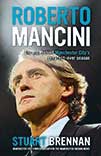Search: ' Roberto Carlos'
Stories
 The man behind Manchester City’s
greatest ever season
The man behind Manchester City’s
greatest ever season
by Stuart Brennan
Andre Deutsch, £16.99
Reviewed by Matthew Barker
From WSC 310 December 2012
Roberto Mancini was a gloriously gifted player. He was also stroppy; prone to outbursts and sulks that frequently alienated him from coaches of club and country and, occasionally, some of his team-mates. Now, as a manager himself, he has to deal with players who can comfortably outdo him on the ego and attitude fronts.
The first 100 pages or so of Stuart Brennan’s book are dedicated to Mancini the footballer, particularly his time at Sampdoria. Mancini’s contention that he was actually a midfield playmaker, rather than an out-and-out striker, caused him problems throughout his playing career. His great vision and unfailing talent for placing the ball where he wanted won him endless plaudits, but fallings out with a succession of Azzurri coaches and a surfeit of Italian attacking talent put the blockers on his international career.
Bar a few stand-out howlers – claiming the Calciopoli scandals took place “six years after” Italia 90, for one – the main problem here is the author’s drawn-out, clumsy theory that Mancini has always sided with the underdog, and that his notorious stubbornness is actually the stuff of an anti-establishment rebel (this despite him being a boyhood Juventus fan).
We are told that his move to Sampdoria in 1982, after a debut season with Bologna, “appealed to his sense of destiny” and that the Genovese club – a “provincial footballing backwater” apparently – provided the perfect platform for someone keen to topple the established Serie A order. And yes, it’s pretty obvious where we’re going with this one.
Less time is spent looking at Mancini’s time in Italy as a coach, which is a pity. The traumas of a first job in charge of Fiorentina, when the club were edging towards bankruptcy and demotion to the old Serie C, are dealt with in a few paragraphs, as is his equally troubled stint at Lazio. Brennan is itching to get to the bit where Mancini takes charge at Inter, so he can triumphantly point out that Nerazzurri are sort of, a bit, kind of like Manchester City. And Milan just like Manchester United. Perfect. Except, of course, they’re not.
The claim that il Mancio was sacked by an “ungrateful” and “impatient” Inter after three post-Calciopoli championship wins is hugely misleading. Most Italian commentators (and did Brennan really not think to speak to one?) believe the coach engineered his move away from the club and that his bluff was called after he reportedly told players he was going to Chelsea following Inter’s 2008 Champions League exit against Liverpool.
Instead of the promised insight and examination, we get a decidedly uncritical portrait; there is little analysis of the handling of Carlos Tévez. The relentless blandness of Mancini’s press conference quotes are interspersed with uninspiring, cut-and-paste retellings of events from the past couple of years, stuff that anyone with a passing interest in British football, never mind Manchester City supporters, surely knows well enough already.
We’re told those City fans are “in delirium”, some lucky ones are even “in ecstasy”, and surely no one can begrudge them that? Brennan sees his subject’s habitual grumpy aloofness as a positive, proof that he’s willing to fight his corner. However, a more searching assessment of Mancini, both as a man and a manager, could have flagged up warning signs of potential troubles ahead.
 The Brazilian title has just been won by a popular club who are also extending their influence behind the scenes. Robert Shaw reports
The Brazilian title has just been won by a popular club who are also extending their influence behind the scenes. Robert Shaw reports
Corinthians clinched their fifth Brazilian national championship on a day when one of their former stars departed. Prior to the start of the final day’s fixture against Palmeiras on December 4, the Corinthians team paid homage to Socrates, who died in a São Paulo hospital earlier that day, by clenching fists in his trademark salute. It was a poignant moment for Corintianos but less so for club president Andres Sanchez whose recent stewardship had been slated by the player known as Magrão (the big thin one).
 The money that added flair to Manchester City’s functionality has put Barney Ronay in a quandary
The money that added flair to Manchester City’s functionality has put Barney Ronay in a quandary
Imagine how boring being a billionaire must be. Not so much the process of becoming a billionaire, which is presumably studded with the thrill of ticking off those billionaire-entry marks: beachhouse-overload, mistress-profligacy, servant-saturation. But just being a billionaire, sealed within your own frictionless seven-star world, conveyed by helicopter gunship from lobby to suite to private island. This must surely be quite dull.
 Paul Kelly looks at how the award for the world’s best player has evolved since 1956
Paul Kelly looks at how the award for the world’s best player has evolved since 1956
In Paris three years ago, after Cristiano Ronaldo became the fourth Manchester United player to win the Ballon d’Or presented by France Football magazine, Alex Ferguson was asked which Old Trafford legends he considered unlucky not to have lifted the prize. “Paul Scholes and Ryan Giggs,” he replied. No Roy Keane? No David Beckham? Ferguson’s wrong side is a lonely place to be.